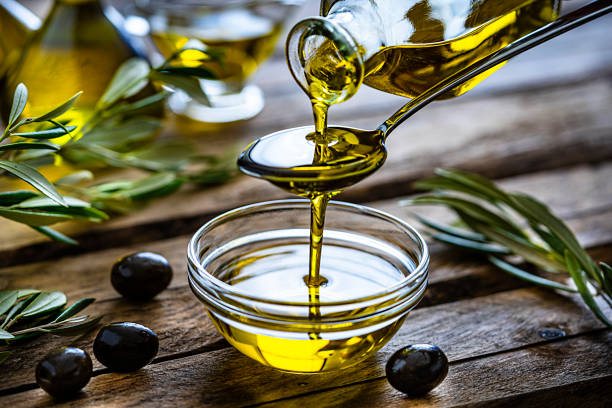Hello, Readers! Olives are fruit enjoyed for thousands of years in the Mediterranean region. They contain beneficial substances like healthy fats, antioxidants, vitamins, and minerals. According to wellhealthorganic.com, olives offer various health benefits. However, it’s also important to be aware of some potential side effects. Let’s explore health benefits and side effects of olives together.
Read Also: Wellhealthorganic.Com/Know-The-Causes-Of-White-Hair-And-Easy-Ways-To-Prevent-It-Naturally
Learn About Olives
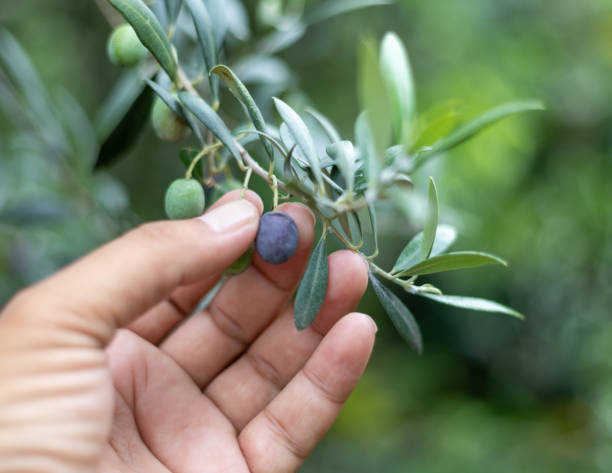
Olives are the fruit of the olive plant, which belongs to a family called Oleaceae. These fruits can be eaten as they are or processed into various products like oil, pickles, and more. Olive oil, made from olives, is a popular and healthy vegetable oil used worldwide.
Figaro Oil is a well-known brand of olive oil that developed in Spain but is now widely used in India. It is a blend of refined and virgin olive oil with a mild taste and aroma. This versatile oil can be used for cooking, baking, making salad dressings, or as a natural moisturizer for your skin and hair.
Read More: Wellhealthorganic.com:winter-skin-care-tips-home-remedies-to-keep-your-skin-moisturised
Health Benefits of Olives: Wellhealthorganic.com:11-health-benefits-and-side-effects-of-olives-benefits-of-olives
Here we have mentioned some health benefits of Olives:
Olives are good for your heart
They contain healthy fats called monounsaturated fatty acids (MUFAs) that can lower bad cholesterol and increase good cholesterol. These fats also help reduce inflammation and prevent blood clots, which lowers the risk of heart disease and stroke. Adding olive oil to your daily routine is a suggested way to benefit from olives.
Olives are beneficial for your skin
They contain a significant amount of vitamin E, which is a potent antioxidant that shields your skin from harm caused by free radicals. Vitamin E also acts as a moisturizer, enhancing the hydration of your skin and improving its elasticity. Furthermore, it helps reduce the appearance of aging signs, allowing your skin to look more youthful and vibrant.
Read More: Divine Glow: Discover the Supreme Essential Oil for Luminous Skin & Haircare
Olives are beneficial for your eyes
They contain lutein and zeaxanthin, which are two types of carotenoids. These carotenoids play a crucial role in safeguarding your eyes against the harmful effects of blue light and UV rays. Additionally, lutein and zeaxanthin help prevent eye conditions such as macular degeneration and cataracts, which can impair vision and lead to eye problems.
Olives have a positive impact on your immune system
They contain polyphenols, which are natural substances found in plants that have properties to reduce inflammation and fight against harmful microorganisms. These polyphenols play a crucial role in supporting your immune system by combating infections and preventing the growth of bacteria and viruses that can cause harm to your body.
Olives are beneficial for your brain health
They contain a type of healthy fat called oleic acid, which can pass through the protective barrier around the brain and nourish brain cells. By doing so, oleic acid helps improve memory, learning abilities, and overall cognitive function by enhancing the communication between neurons in the brain.
Side Effects of Olives: wellhealthorganic.com:11-health-benefits-and-side-effects-of-olives-benefits-of-olives
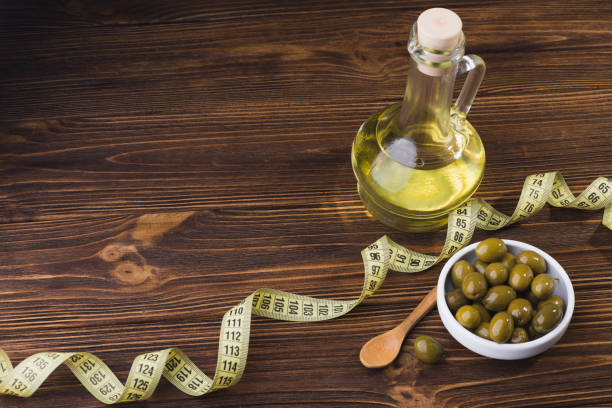
Why Not Use Olives?????
Some people may have allergies to olives or their components, which can cause swelling, itching, hives, rashes, or even a severe allergic reaction called anaphylaxis.
Eating too many olives or not being used to them can lead to stomach discomfort or diarrhea. This may be because of olives’ high fat or fibre content or certain compounds that can irritate the digestive system.
It’s important to note that olives may contain high amounts of salt or additives. They are often cured or processed with salt, vinegar, or lye to improve their taste and prolong their shelf life.
Benefits of Olive Oil (Jaitun Oil)
Jaitun Oil, also known as Olive oil, is versatile with many advantages for our bodies. It is made from the fruits of the olive tree and is commonly used in cooking and skin care. Here are some of the benefits of using Olive Oil:
Olive oil moisturizes the skin and reduces signs of ageing. It contains vitamin E and antioxidants that protect the skin from damage and make it more elastic. It is especially helpful in healing dry and cracked areas like the lips, heels, and cuticles.
Olive oil enhances skin health and prevents the acne. It has properties that reduce fight bacteria and inflammation, keeping the skin clear and healthy. It also helps to maintain the skin’s natural oil balance and prevent clogged pores.
Olive oil keeps hair healthy and shiny. It nourishes the hair follicles and strengthens the hair strands, preventing hair loss, dandruff, and split ends. Olive Oil can be used as a a hair mask or conditioner to hydrate and soften the hair.
Olive oil is an effective makeup remover and facial cleanser. It removes dirt, oil, and makeup residue from the skin without drying it out. Olive Oil can be used as a gentle and natural way to cleanse and purify the skin.
Boosting Immunity with Jaitun Oil
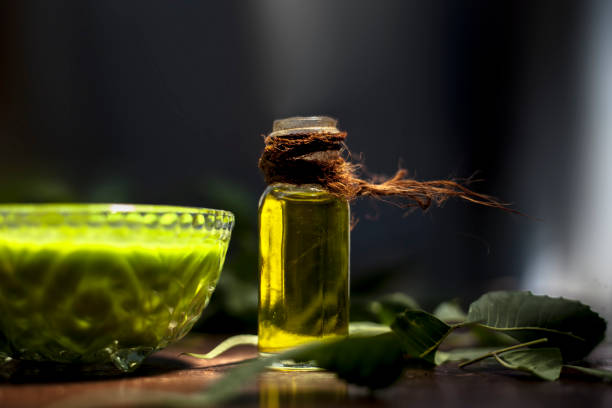
Boosting Immunity with Jaitun Oil
Jaitun Oil, or Olive oil, can help boost our immune system and lower cancer risk. It contains beneficial compounds like omega-3 fatty acids and polyphenols that support the immune system and reduce inflammation. Olive Oil also has properties that can inhibit the growth of cancer cells and provide protection against colon and bowel cancer.
Olive Oil is a versatile natural product that offers numerous benefits for enhancing beauty. It is available in various grades, including extra virgin, virgin, pure, refined, and pomace, which are determined by the quality and processing of the olives.
Among these, extra virgin olive oil is highly regarded for its exceptional qualities in terms of both health and beauty. Being unrefined, it retains the highest concentration of nutrients and antioxidants.
Proper storage of Olive Oil is crucial to maintain its quality. It is recommended to store it in a cool and dark place to prevent exposure to light and heat, which can degrade its beneficial properties.
By following appropriate storage practices, Olive Oil can typically be preserved for a period of up to two years, ensuring its effectiveness for beauty-related purposes.
Are Black Olives as Nutritious as Green Olives?
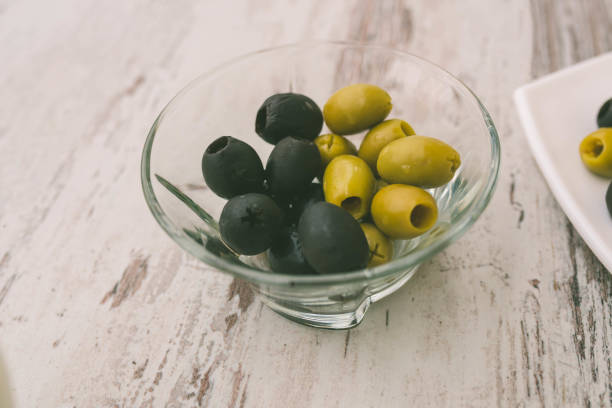
Are Black Olives as Nutritious as Green Olives?
Black olives are delicious and packed with nutrients that are beneficial for your health. Here are some reasons why you should include black olives in your diet:
- Black olives contain healthy fats that can improve your heart health by lowering harmful cholesterol levels.
- They are a great source of vitamin E, an antioxidant that protects your cells from damage and helps keep your skin healthy. Vitamin E also has cancer-fighting properties.
- Black olives provide fibre, which aids in digestion, helps lower blood pressure, and keeps you feeling full for longer.
- They are a good source of iron, an essential mineral that helps produce red blood cells and transports oxygen throughout your body.
- Black olives have anti-inflammatory effects, which can help reduce symptoms of conditions like arthritis and asthma.
- To experience the advantages of black olives, you have various options to enjoy them. They can be savored as a snack, or you can add them to salads, sandwiches, pizzas, and pasta dishes to enhance the taste.
- Another delightful way to incorporate black olives into your meals is by creating a tapenade, which involves blending them with garlic, lemon juice, and olive oil. Black olives are versatile and can contribute to the flavor of your dishes.
- Nevertheless, it is important to be cautious of the sodium content in canned or jarred black olives. Before consumption, it is recommended to rinse them thoroughly to reduce the intake of salt.
Olives and Weight loss: wellhealthorganic.com:11-health-benefits-and-side-effects-of-olives-benefits-of-olives
Olives and Weight loss
Olives are delicious and can support weight loss due to their healthy fats and low-calorie density. They are packed with antioxidants that protect your cells and reduce inflammation. However, consuming olives in moderation is essential as they can be high in sodium and calories.
Read More: Safe Weight Loss Diet - Reduce Carbs For Health
Different types of olives have varying amounts of phenols and sodium. Greek-style black olives have more sodium and phenols than green or California-style olives. You can enjoy olives as a snack or add them to your meals like pasta dishes, salads, pizzas, or sandwiches for added flavour and health benefits.
Read Also: Delta 9 Gummies: A Revolutionary Weight Loss Aid For Fitness Enthusiasts
Olive: A Natural Brain Booster
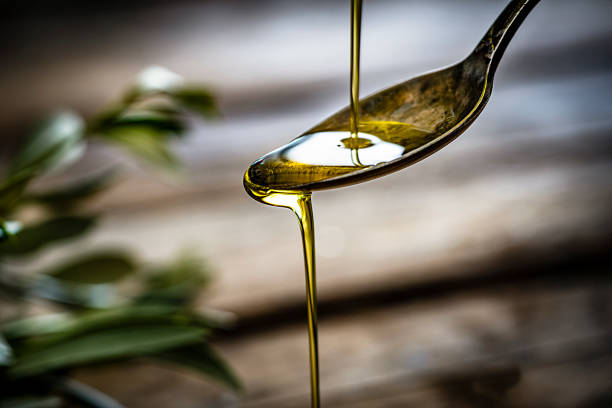
Olive: A Natural Brain Booster
Olive, a tree that produces edible fruit, leaves, and seeds, has several health benefits. Some people consider olives a natural “smart drug” or nootropic due to their potential to enhance cognitive performance and protect the brain from ageing and stress.
Olive Oil is obtained from the fruit of the olive tree and is rich in monounsaturated fats, which have the ability to lower cholesterol levels and decrease the likelihood of heart disease and stroke. Additionally, it contains beneficial antioxidants such as vitamin E and polyphenols that safeguard the brain cells against harm and inflammation. Studies indicate that olive Oil may even enhance memory and cognitive abilities, especially in older individuals.
Olive leaf, frequently consumed as a supplement, has antibacterial, antifungal, and antiviral qualities that can help fight against infections and strengthen the immune system. These leaves contain a compound called oleuropein, which aids in reducing blood pressure and relaxing blood vessels. Additionally, studies on animals suggest that olive leaves may provide protection to the brain, preventing cognitive decline and Alzheimer’s disease.
When ground into a powder, olive seeds provide fibre, protein, and essential minerals such as magnesium, calcium, and iron. These seeds may also have anti-inflammatory and antioxidant effects beneficial to brain health and overall well-being.
Using olives as a food or supplement is generally safe. Still, it is essential to be cautious when taking certain medications like blood thinners, blood pressure medications, or diabetes drugs. It is advisable to consult with a doctor before using olive as a smart drug.
Vitamin E: The Power of Olive Oil

Vitamin E: The Power of Olive Oil
Vitamin E is a unique nutrient that protects our cells from damage. It helps boost our immune system, keeps our vision sharp, supports reproduction, and promotes healthy skin. Olive Oil, as mentioned on wellhealthorganic.com:11-health-benefits-and-side-effects-of-olives-benefits-of-olives, is a source of vitamin E that we can include in our diet.
In olive Oil, the type of vitamin E present is alpha-tocopherol, the most active form of vitamin E in our bodies. Just one tablespoon of olive oil can provide about 10 per cent of the daily value of vitamin E that adults need, around 15 milligrams per day. Olive Oil contains other essential nutrients like vitamin K, omega-3, and omega-6 fatty acids.
However, it’s important to remember that olive Oil is high in calories and fat. That’s why using it in moderation is recommended as part of a balanced diet. Another interesting fact is that vitamin E helps prevent olive Oil from going bad, keeping it fresh and preserving its quality for longer.
Lemon and Olive Oil: A Healthy Pairing
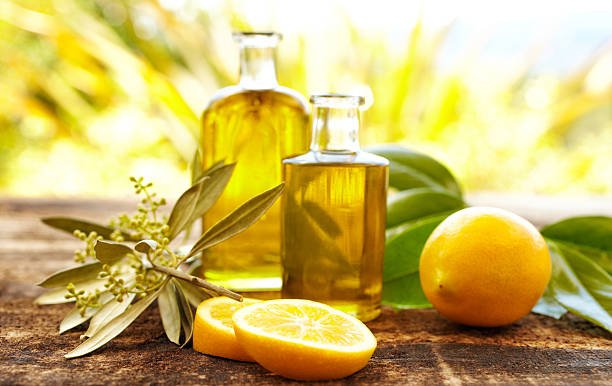
Lemon and Olive Oil
Lemon and olive oil are natural ingredients with numerous health advantages and versatile culinary uses. Lemon oil is derived from the peels of lemons and other citrus fruits, packed with vitamin C, flavonoids, and antioxidants. On the other hand, olive oil is extracted from ripe olives and is abundant in polyphenols, monounsaturated fats, and vitamins E and K. Both lemon and olive oil bring unique benefits and flavors to various dishes.
You can use lemon and olive oils separately or together for different purposes. They make a delicious homemade dressing, pasta, fish, marinade, or sauce for salads, and vegetables. They can also be used to create a detox drink that may help cleanse the liver and gallbladder.
These natural oils add flavour and health benefits to our meals, making them an excellent choice for enhancing our cooking and overall well-being.
Lemon-Infused Olive Oil and Detox Drink
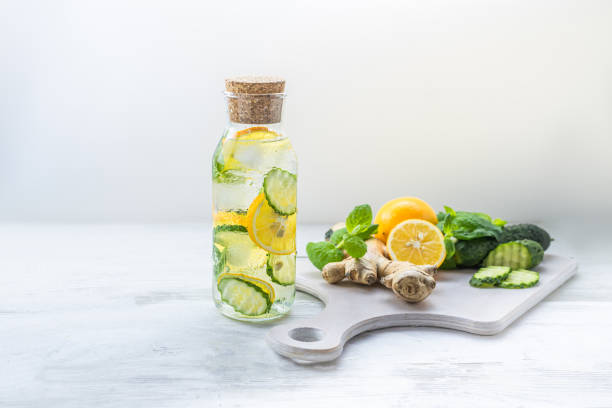
Lemon-Infused Olive Oil and Detox Drink
You have two options for creating lemon-infused olive oil: you can cold-press lemons along with olives, or you can heat olive oil with lemon peel. Both methods infuse the oil with a delightful lemon taste, perfect for enhancing the flavors of salads, marinades, and other dishes.
Mix one tablespoon of olive oil with one tablespoon of lemon juice for a detox drink. This drink is best consumed on an empty stomach and may help clean the liver and gallbladder.
These simple recipes allow you to enjoy the benefits of lemon and olive oil in delicious and easy ways.
How to Prepare Olives?
There are various ways to prepare and use olives in your meals. You can purchase olives from grocery stores in different forms, such as canned or bottled in a salt solution or water. Fresh olives may also be available at certain speciality stores.
Olives can be served whole, often seen on charcuterie boards or cheese plates. Suppose you want to make your own olive oil. In that case, it’s a complex process involving equipment like a grinder, immersion blender, and weight for pressing. Cold-pressing is preferred, as it helps retain the oil’s integrity.
Apart from olive oil, here are some other ways to use olives in recipes:
- Drizzle them on hummus.
- Use them as a garnish or ingredient in cocktails.
- Use them as a base for salad dressings.
- Substitute less healthy oils with olive oil in baking recipes.
- Chop them up to make a tapenade.
- Slice and use them as pizza toppings.
- Add them to pasta dishes.
- Cut and use them as sandwich toppings.
- Stuff large olives with soft cheese for appetizers.
These are just a few examples of how olives and olive oil can be incorporated into your cooking.
Conclusion
Based on information from wellhealthorganic.com:11-health-benefits-and-side-effects-of-olives-benefits-of-olives, olives are a tasty and nutritious fruit. However, it’s essential to be aware of potential side effects. Eating too many olives can cause digestive problems, and you must be cautious if you take certain medications. Some side effects of olives include increasing sodium intake, triggering acid reflux, and causing skin reactions. To stay safe, it’s best to enjoy olives in moderation and consult a doctor if you have any concerns.
Read More: Wellhealthorganic.com:11-Health-Benefits-And-Side-Effects-of-Olives-Benefits-of-Olives You Never Knew- Sandata DataPlus: Transform Healthcare Management
- Paul Mackoul MD Lawsuit: Unpacking Implications for Patient Safety and Medical Ethics
- Baggot Street Mercy’s Login Features
- Wellhealthorganic.com : morning coffee tips with no side effect
- ContactsJet.shop: Your Trusted Source for Affordable Contact Lenses
- Healthtdy.xyz: Transform Your Health with Reliable Information and Interactive Tools
- Right Eye Twitching in Women: What It Means and How to Stop It
- Anthropometric Measurements: Importance and Uses in Healthcare and Design
- BlueFire Wilderness Complaints: An Overview
- 4 Ways to Become a Certified Indoor Cycling Instructor

